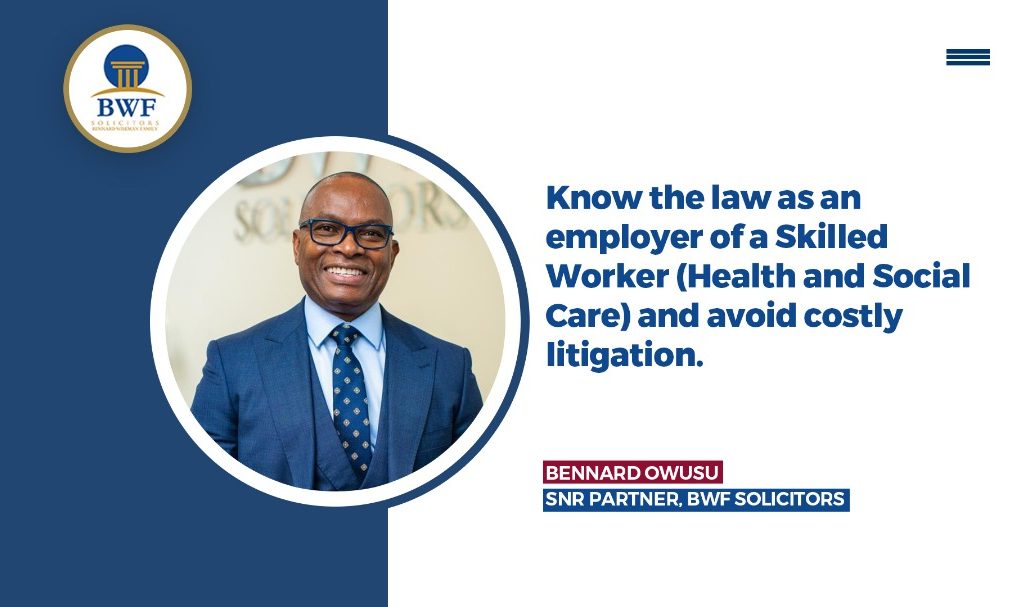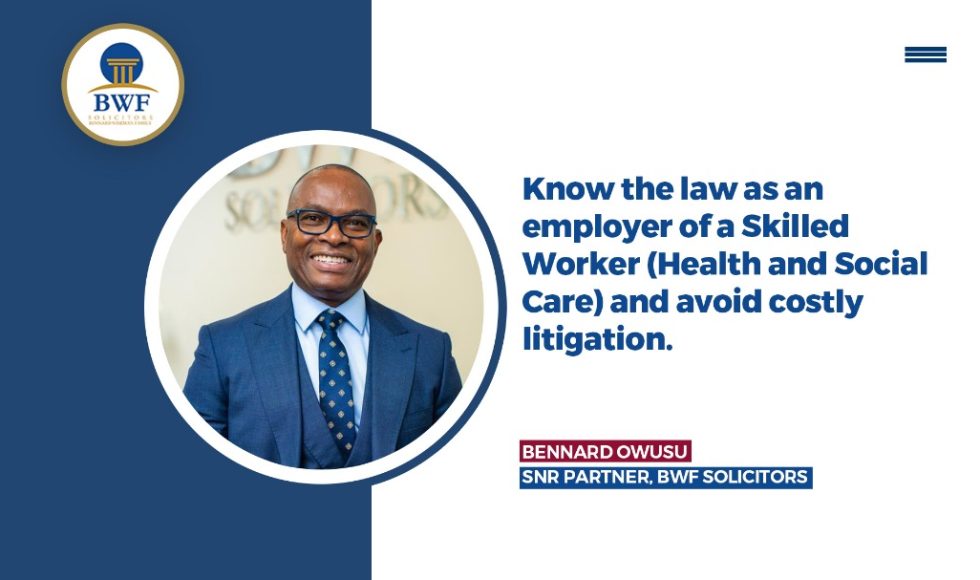KNOW THE LAW AS AN EMPLOYER OF A SKILLED WORKER (HEALTH AND SOCIAL CARE) AND AVOID COSTLY LITIGATION.
Work-related disputes and employment tribunal claims by an ex-worker whom you dismissed can be damaging and costly. It is therefore important to know the law around fair dismissal as an employer.
Dismissal within Two Years of Employment
What then is the position if, within the first two years of their employment, you need to dismiss an employee?
If your employee has been employed for under two years, they do not have the usual unfair dismissal rights under Section 108 of the Employment Rights Act 1996.
That means they cannot bring a claim for unfair dismissal except in specific circumstances.
These specific circumstances include dismissals relating to:
- pregnancy and maternity;
- discrimination;
- whistleblowing;
- victimisation;
- health and safety;
- trade unions;
- working time;
- minimum wage;
- the exercising of a statutory right;
- refusal to comply with an unenforceable zero-hours contract.
In contrast, if an employee has worked for you for 2 or more years, you would need to provide one of the five fair reasons set out under the Employment Rights Act of 1996.
An employee who has been employed for fewer than two years may also claim wrongful dismissal if there has been a breach of the terms of their contract of employment, for example, if they have not been given the relevant notice period or a payment in lieu of notice.
There are circumstances when you can dismiss an employee with fewer than two years of service. These circumstances may include persistent lateness, poor performance, and inappropriate conduct, amongst other things.
Under the Employment Rights Act 1996, Section 94, an employee has a right not to be unfairly dismissed.
Under the 1996 Act, s98(1), a dismissal will be unfair unless the employer establishes that ‘the reason (or, if more than one, the principal reason) for the dismissal’ was one of a specified set of so-called ‘potentially fair’ reasons.
These include a reason that relates to the capability or qualifications of the employee for performing work of the kind that he was employed by the employer to do’. If such a reason is established, the fairness of the dismissal then turns on whether the employer’s decision was reasonable under the 1996 Act, s. 98(4).
However, under the 1996 Act, s. 103A, a dismissal is ‘automatically’ unfair if the reason or principal reason for it is the fact that the employee has made a protected disclosure.
Bearing in mind the above, your first step should be to check the terms of your employee’s contract of employment. Be mindful of anything in the contract relating to the dismissal procedure; you should act in accordance with those guidelines.
If the contract does not mention the dismissal procedure, you will have a measure of freedom to act. You do not have to provide in the same way you would with employees who have worked for you for more than two years.
However, it is still good practice and will give you some protection against potential claims brought by the employee. From a legal perspective, the main aim will be to follow any process in the contract, but also to show that the reason for the dismissal is beyond doubt: not automatically unfair or otherwise unlawful.
Follow a clear process.
We always advise clients to use the ACas Code of Practice on disciplinary and grievance procedures (https://www.acas.org.uk/acas-code-of-practice-for-disciplinary-and-grievance-procedures/html). It is the minimum an employer should follow for handling these issues at work.
The first step should normally be to arrange to meet with your employee to discuss your concerns. It is also a good idea to let them know they can have someone present at the meeting and to give them advance notice of the reason for the meeting.
During the meeting, explain your concerns. Try to agree on a way in which you could help your employee improve, perhaps with additional training or support.
Try to agree on clear and reasonable targets and a time frame for achieving them. You’ll probably want to keep the time allowed for this quite short, but if you are offering a chance to put things right, then the time period should be realistic. If it is unrealistic, the employee may argue that your true reason for the dismissal is automatically unfair or otherwise unlawful. It’s worth ensuring that there is a written record of the meeting and that your employee has a copy of it.
If the employee still fails to meet the requisite standard, then you can dismiss them. Depending on your contract, you may not have to give further notice, although you can do so if you wish. Check whether you need to wait until the end of their probationary period or provide an appeal procedure in respect of your decision. Again, you should always talk to an expert before you dismiss an employee.
Following the meeting, decide on what action, if any, to take. Decisions should be communicated to the employee in writing, without unreasonable delay, and, where appropriate, should set out what action the employer intends to take to resolve the grievance. The employee should be informed that they can appeal if they are not content with the action taken.
Although it may seem easier to dismiss an employee within two years, the key thing to remember is that this should never be done lightly.
You should ensure:
- you have followed the contract;
- it is clear what your reasoning is;
- that your reason for dismissal is not automatically unfair or otherwise unlawful.
Following a clear process when dismissing an employee will help make sure that your decisions and actions are appropriate from a legal perspective.
The above should assist in preventing costly litigation.
Need more help?
We assist our clients’ businesses with employment law advise and guide employers on how to approach dismissals. This is to minimise legal risks while protecting our client’s business’ commercial interests. Kindly contact us if you need tailored legal advice.
UK: +44 20 8493 7340
GH: +233 55 589 5959
Emergency: +44 77 1276 1884
Eunice: +44 75 3581 3910
Charles: +44 79 4763 6037
Email: admin@bwfsolicitors.com
Bennard Owusu is an accredited member of the Law Society Family Law Accreditation Scheme and a member of the Ghana Bar Association. Family Law Accreditation is a recognised quality standard for family law practitioners in the U.K.








